Top 10 Business Reputation Management Tools
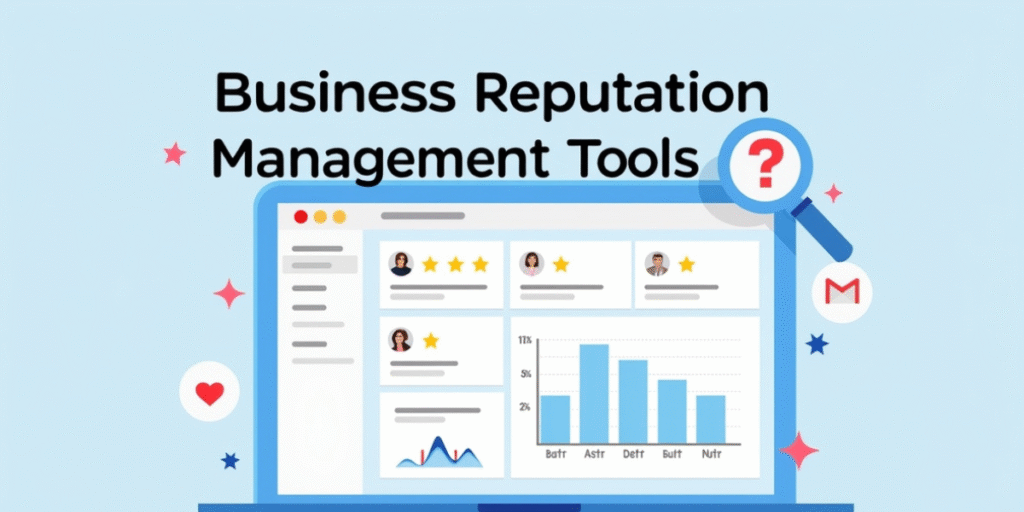
In an ever digital-first world, your reputation can make or break your business success more quickly than ever. As customers are more than ever using online reviews, social media and search engines to rate businesses, positive online presence is now the key to survival and development. The online reviews have become a reliable source of information as much as personal recommendations, which is why managing the reputation is no longer an option but a necessity among modern consumers.
The emergence of social media sites, review sites, and real-time communication has increased both positive and negative feedback, building a picture where companies are expected to closely watch and control their online presence. This is a detailed guide on the best Business Reputation Management Tools that can assist you to take charge of your online story, earn customer trust, and achieve long-term business growth in an ever-tighter market.
Define Business Reputation Management (BRM)
Business Reputation Management (BRM) is the art and science of tracking, shaping and managing your presence online and the way society views you in all online platforms.
This all-inclusive science covers the process of monitoring the mentions of your brand, responding to customer reviews, addressing the online reviews, and taking the initiative of crafting the image of your company. BRM is sentiment analysis on different platforms such as review sites, social media, news media, and search engines, to know what customers and prospects think about your brand.
It is all about establishing an organizational process of establishing loyal relationships with customers and responding to negative feedback in a constructive way. Effective reputation management is the combination of both reactive and active efforts to create a good review and testimonial.
With the help of advanced solutions like GEO Tools, businesses can strengthen their visibility and credibility online. The long-term objective is to make certain that, upon keying in your business in the search engines, potential customers find valid, positive, and compelling information which compels them to purchase your products or services as compared to your competitors.
Why Business Reputation Matters
- Customer Trust and Credibility: A great reputation will create an instant trust with potential clients, where 93% of customers read online reviews, prior to making a purchase, and good reputation reflects reliability and quality.
- Revenue and Sales Impact: More online ratings lead to increased revenues by 5-9 % in comparison to competitors because the reputation directly determines the customer conversion rates and readiness to pay above-average prices.
- Competitive Advantage: Good reputation management provides differentiation in saturated markets that enables the businesses to stand out as customers weigh a number of options and make a decision based on perceived trustworthiness.
- Crisis Mitigation: Positive reputation management offers a shock absorber in the face of adversity, because well-regarded brands can recuperate quicker after adverse experiences and hold on to customers amidst crisis.
- Talent Attraction: Study has shown that quality employees investigate company reputations prior to application and organizations with a good reputation obtain more talent, less hiring expenses, and elevated employee retention rates.
- Long-term Sustainability: Reputation is a good intangible asset and it increases as time goes by, it gives the company competitive advantage and endurance in the competitive market and other economic shocks.
Key Components of Reputation Management
- Online Review Monitoring: Consistently monitoring reviews online on sites such as Google, Yelp, Facebook and industry specific sites, to learn how customers feel and where improvements can be made within a short period of time.
- Social Media Management: Proactively monitoring social media mentions of the brand, and communication with customers as well as administration of social media accounts to ensure the brand communication and relationships with customers are consistent.
- Review Response Strategy: creating professional methods of responding to both positive and negative comments, clarifying issues, and expressing gratitude to customer feedback in a timely way.
- Content Creation and SEO: Generating high-quality content that is search-engine friendly, placing positive information within the top ranks, and keeping the accurate business information somewhere in the forefront of the web.
- Crisis Communication: Develop policy on how to deal with negative publicity, PR crisis management and establishing open communication channels with the stakeholders in difficult circumstances to reduce negative effects to reputation.
- Performance analytics: Measuring reputation-based metrics such as review scores, sentiment analysis, volume of mentions and tracking performance over time to show ROI and inform strategy changes.
Common Challenges in Reputation Management
There are significant issues that a business encounters in its management of online reputation:
- Volume and Scale Management: It is impossible to follow mentions on hundreds of channels and review platforms without the appropriate tools, particularly in multi-location enterprises that manage several customer touchpoints at a time.
- False and Spoof Reviews: When it comes to fraudulent negative reviews, one should handle foul play by competitors or dissatisfied persons who might not be actual customers and who have to go through the verifying and dispute process.
- Response Time Expectations: Customers want quick response to review and complaints, and when the reactions are delayed the negative situation can grow and more chances to damage the image appear.
- Unpredictable Brand Messaging: Consistent voice and message across various staff, places and channels and ensure that any answers do not conflict with brand values and communications expectations.
- Resource Allocation: How to divide staff time and budget between reactive reputation management activities and proactive approaches to positive reputation building by quality service and marketing activities.
- Measuring ROI: So effectively quantifying the financial effects of reputation management activities and relating reputation measures to business ones such as sales, customer acquisition, and customer retention rates.
Top 10 Tools for Reputation Management
1. Qualtrics ORM
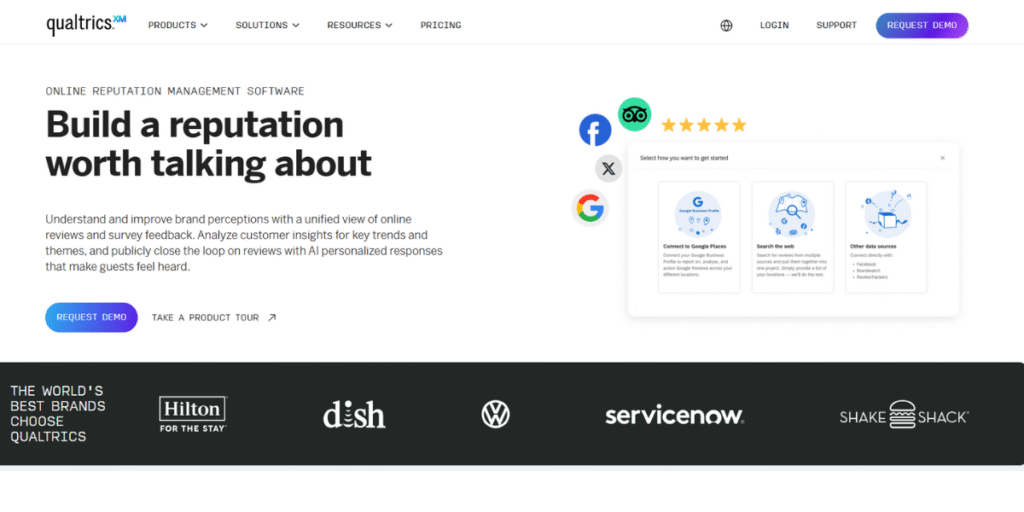
The problem of the mismatch between the actual survey and the social listening is resolved with the help of the reputation management system offered by Qualtrics and contributes to finding the balance between one opinion about the contents of the online reviews and the responses to the survey questions. This is solved by dynamic analytics, and they offer reporting facilities with the help of which the organizations get a vision of the entire customer experience.
As a powerful Business Reputation Management tool, it is able to integrate Google Business, create and examine above a single Google Review, and thus it can come in handy especially in the scenario of multi-location organisations. Its advantage lies in the fact that the platform not only has a pool of structured surveys data but also unstructured mentions and reviews on social media and presents all the data in the customer sentiment and brand perceptions.
Key Features:
- Planned survey/review dashboard.
- Multi-location Google Business account integration
- Advanced sentiment analysis and text analytics
- Auto-triggered workflow triggers of response management.
- Real-time alerting for brand mentions and reviews
Pros:
- Native connection with current Qualtrics ecosystem.
- Vivid analytics and reporting.
- Enterprise-level security and compliance features
- Comprehensive customer experience view
Cons:
- No, cheaply, in comparison to units-based reputation tools.
- Hard installation that will require expertise.
- Weak social media monitoring.
- Mainly a business clientele.
Pricing: Enterprise-custom pricing on the basis of features and use requirements.
Best for: As a result of the extensive experience in the management of qualtrics, big organisations.
Website: https://www.qualtrics.com
2. ReviewFlowz
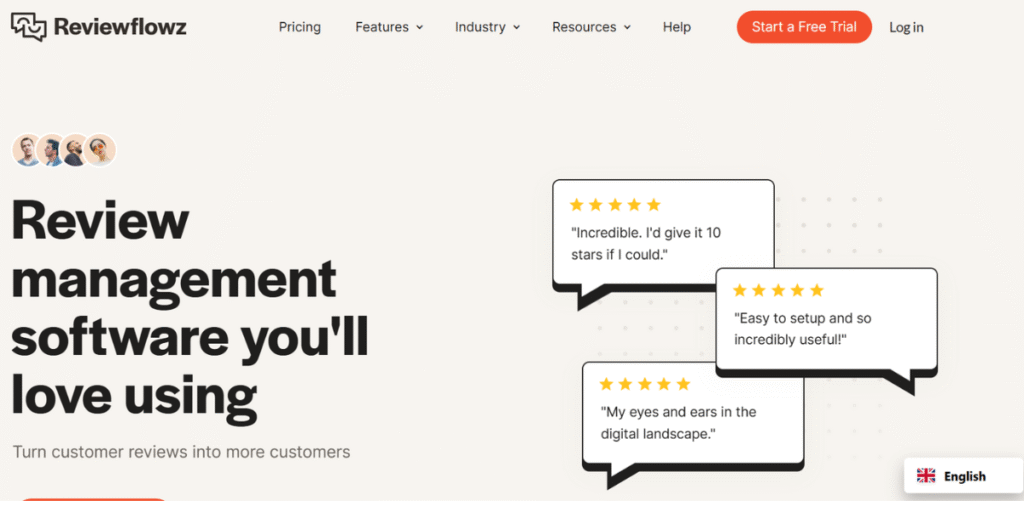
ReviewFlowz is a low cost review monitoring and management software that is comparably cheap to most systems and agencies and relatively cheap to small to medium sized firms. It will target automation of the review collection and review response and analytics of the performance of the review on the site. Agency plan commences with 199/ month and agency plan with all the functions of the review management, 10 clients 25 location profiles and 30,000 mails/ month.
The Uniqueness functions of ReviewFlowz work on the principle that it is agency friendly i.e. the marketing agencies can lazily create and maintain a pool of client accounts. The availability and the degree of scrutiny of the various review sites and social networks is one of the most significant aspects of focus in the platform, making it an effective tool for Business Reputation Management and client success tracking
Key Features:
- Multi-client agency dashboard management
- Automated review invitation campaigns
- Cross-platform review monitoring and alerts
- Customizable response templates and workflows
- White-label reporting for agency clients
Pros:
- Affordable pricing for agencies and small businesses
- User-friendly interface with quick setup
- Strong customer support and training resources
- Flexible client management features
Cons:
- Ineffective superior analytics of business products.
- Basic social media monitoring capabilities
- Fewer integration options with third-party tools
- There is not so complex functionality of review widgets.
Pricing: Agency plans as low as $199/month 10 clients and 25 locations.
Best for: Digital marketing agencies with a status of multiple clients.
Website: https://www.reviewflowz.com
3. Reputation.com
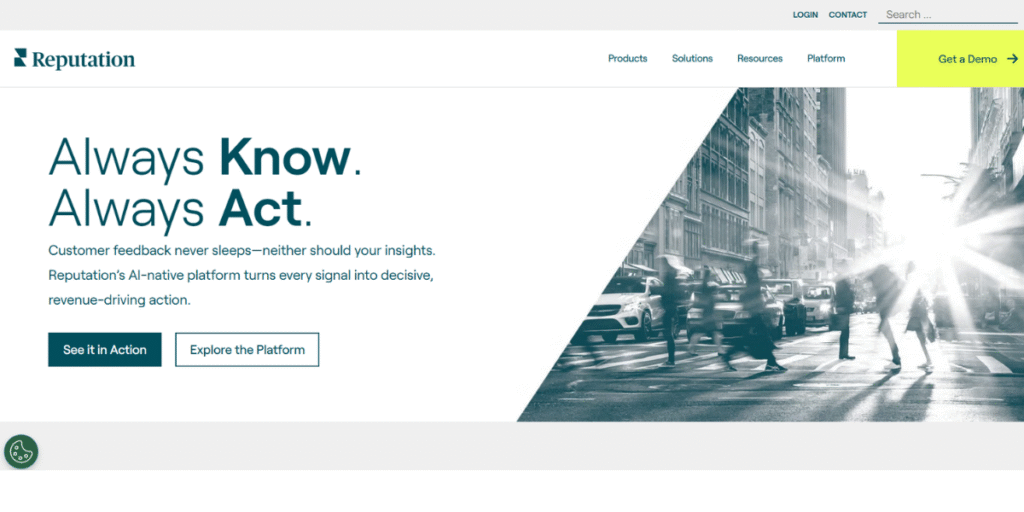
It is among the most advanced business reputation management systems, and serves enterprise customers with custom brand monitoring and customer experience management needs. The platform is a combination of artificial and human intelligence aimed at providing actionable insights informed by customer feedback across channels. Reputation.com is a dominant force over multi-Location businesses with thousands of customer interaction points.
The platform offers advanced features, including competitive benchmarking and predictive analytics, and custom reporting, which can support the enterprise clients with making data-driven decisions in terms of their reputation management plans.
Key Features:
- AI-driven sentiment analysis and insights read between the lines.
- Comprehensive multi‑platform monitoring keeps tabs on mentions across Facebook, Google, Yelp, etc.
- High-level competitive benchmarking tools measure how you measure up to competitors.
- Dashboard personalisation and reporting – design your own or present it to the team.
- Professional level security and compliance-data guarded as large teams should.
Pros:
- Grades of features that meet the needs of a corporate workflow.
- Smart AI and machine learning that learns about your information.
- Excellent customer-service and rocket scientists.
- An integration system that is well integrated.
Cons:
- Costly and unusual when you are in a small outfit.
- Interfaces become cumbersome; one would need part of the training to master it.
- Contracts are long-term entrapment.
- Excessive unless you require advanced reputation features.
Pricing: Custom enterprise plans offer lower prices beginning at a couple of thousand dollars monthly.
Best for: Large companies during periods of heavy to heavy branding.
Website: https://www.reputation.com
4. Podium
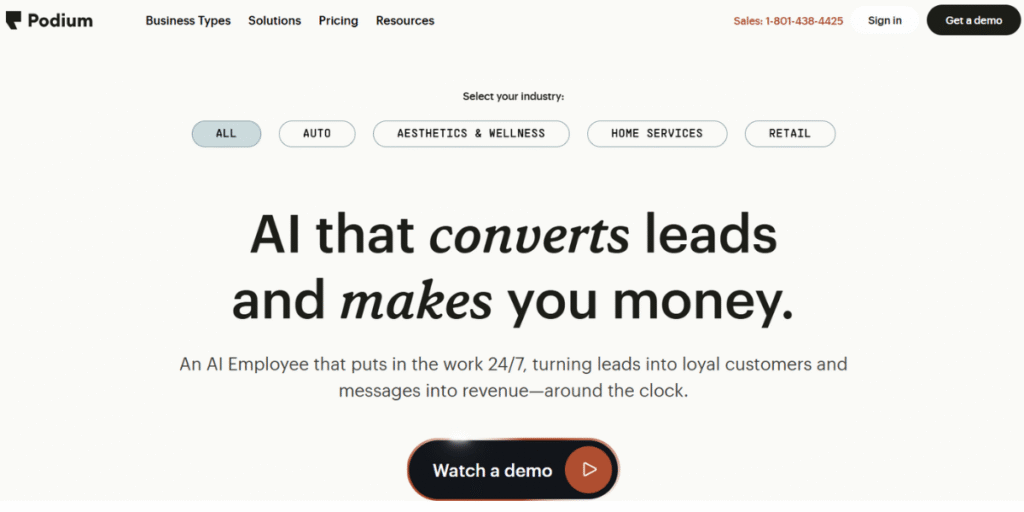
Podium is also positioned as a customer messaging platform, with powerful reputation management tools, with the emphasis around conversational commerce and customer engagement. The platform is efficient in two-way communication between businesses and customers via text messaging, webchat, and review management.
The strategy by Podium focuses on fostering relationships by speaking with people instead of merely tracking mentions; hence it works well within a service-based business that values personal connections with customers. This conversational approach often results in higher review collection rates, more authentic customer interactions, and ultimately stronger Business Reputation Management outcomes.
Key Features:
- Text messaging and webchat integration chat lives where your customers already are.
- Invite to review via messaging write thank-you messages that become reviews.
- Coordination (Multi-location) of message- Chat anywhere.
- Payment processing through conversations collects bids, bills, or bookings right in the chat.
- Turn a text into a sale lead generation and conversion tools.
Pros:
- Review collection and messaging become part of one flow.
- a text is more engaging as opposed to email.
- User experience is exceedingly easy even when you are tech-a-helic.
- Easy mobile device game to rule on.
Cons:
- Analytics are not deep like so-called specialist ones.
- Flagitious access increases the price.
- Focuses on messaging, not on‑screen monitoring.
- May may require third-party 360 representation.
Pricing: Small groups begin at approximately $399/month.
Best for: Service based stores, which would prefer to have checked customer conversations.
Website: https://www.podium.com
5. Birdeye
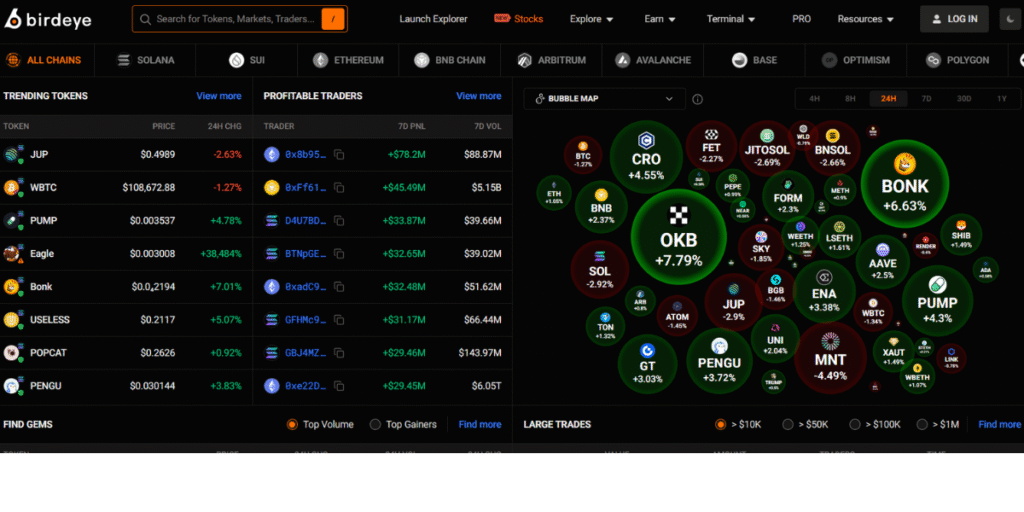
Concise offerings of Birdeye include full reputation management and social media featuring advanced IA to enable local enterprises to increase their presence and experience online. Birdeye uniquely focuses on serving multi-location businesses through its powerful location management, automated review collection capabilities, and comprehensive Business Reputation Management features.
Birdeye is a product that has an end to its customer experience, including initial customer procurement, and after-sales services. The insights provided in the platform are AI-driven and it allows the business to know the customer sentiment tendencies and areas where it can improve customer experience in every customer touch point.
Key Features:
- Auto-read your feedback vibe An AI-powered review and sentiment analysis.
- Multi-listing locations began to manage all your locations anywhere.
- Automated campaign of sending review invitations-autopilot.
- Social media monitoring and management watch and respond on your socials.
- Customer Insights and feedback- collect the customer pulse.
Pros:
- End to end complete platform.
- AI + automation that saves tons of time.
- Multi-location tools are powerful and simple to install.
- Stable assistance and support to start you off.
Cons:
- One-location shops can be expensive.
- Advanced features require training.
- Tools may be not simple enough.
- Contracts bind you to improved pricing.
Pricing: $299/month per site annual plan.
Best for: Multi-location businesses that require a reputation grind in full spectrum.
Website: https://birdeye.com
6. Sprout Social
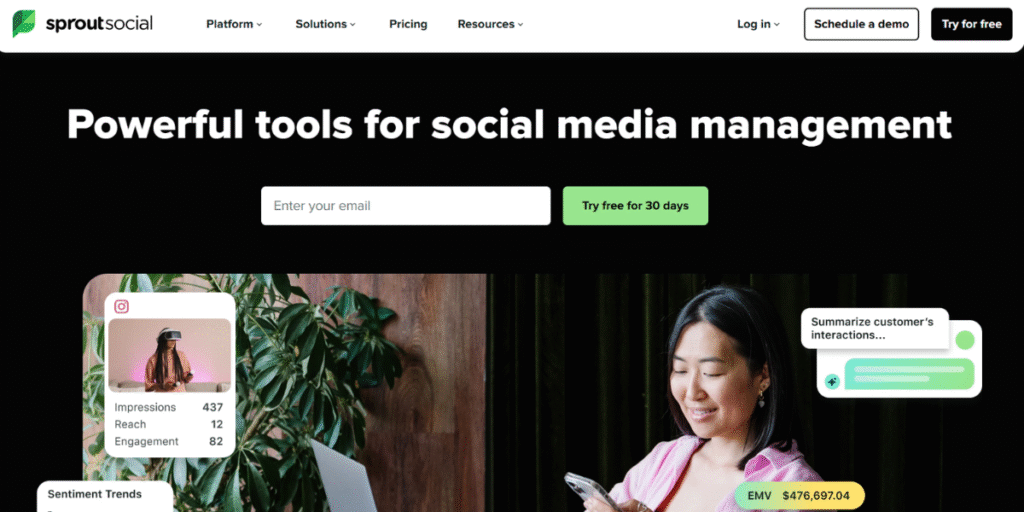
Sprout Social monitors Google My Business and Yelp, Trustpilot, Tripadvisor, Glassdoor, Google Play Store, and Apple App Store reviews, and offers sentiment analysis and suggestions on responding. Sprout Social is not just a social media management platform, but over time, it has added various features to its product to serve as a holistic reputation monitoring tool. The major advantage of Sprout Social is the ability to do social listening, enabling companies to track formal reviews alongside brand mentions on social media. The platform delivers deeper analytics to enable businesses to learn how social media activity correlates with reputation metrics.
Key Features:
- All‑in‑one social media pro suite
- Monitor and track reviews across every platform
- Intelligent listening as well as mentioning brands.
- Auto sentiment check on every channel
- Built‑in customer service and response tools
Pros:
- Compatible with nearly all social media managers you’re on.
- Easy‑to‑use interface, feels like a walk in the park
- Deep analytics and clear reporting
- Includes all platforms that you will want to monitor.
Cons:
- Completive reputation is a little more expensive.
- Not as specialized as a pure reputation tool.
- There is a limitation to – Review-collection automation.
- It requires a little social media know-how.
Pricing: Start at about $199 a month for the standard kit + rep add‑ons
Best for: It is the one in case you are all about livening your social media but keeping your rep trim.
Website: https://sproutsocial.com
7. Yext
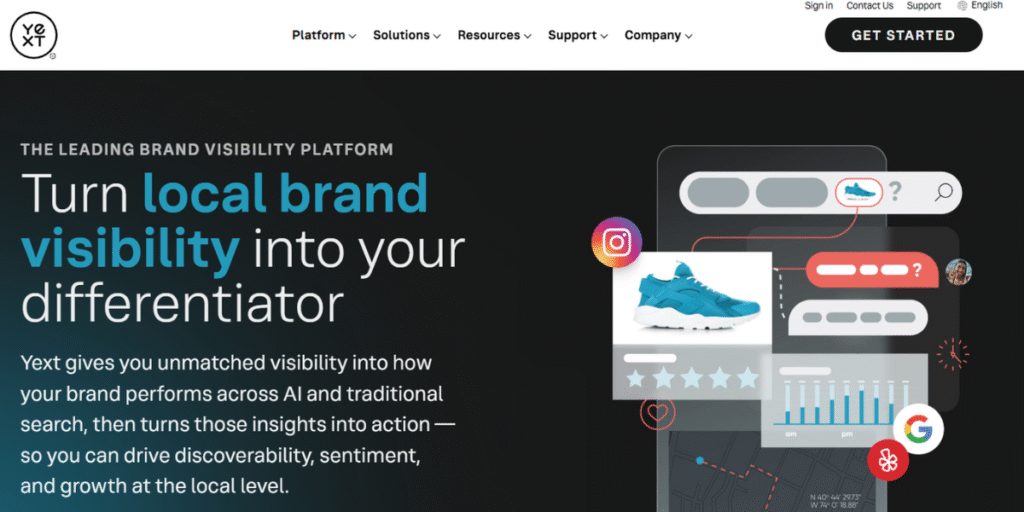
Yext thrives on business listing management and search optimization with the addition of reputation monitoring as an auxiliary. The site excels at maintaining business information consistency across hundreds of directories and search engine builds a reputation management base.
Review monitoring, intelligent responses, review generation, and integration with other review sites are the main functionality of Yext with its advantages in extensive coverage, comprehensive data, and convenient interface. Yext has a strategy of owning the narrative by using correct business data and improving search presence, which is especially valuable to local search presence businesses.
Key Features:
- Managing business listings across 200+ directories
- Monitoring review and responding.
- Boosting search rankings and local SEO tools
- Dashboard with real‑time performance insights
- Automatic syncing of biz info.
Pros:
- Affordable plans for small shops
- Local search wins Laser-focused.
- All‑in‑one directory management
- Simple interface for anyone
Cons:
- Limited deep reputation tools
- Not a full social media monitor
- Basic analytics vs. niche tools
- Mainly about listings, less on reviews
Pricing: Annual plans begin at $199 and reach up to $999 in line with the bells and whistles.
Best for: Small businesses as the ones that would like to dominate local search.
Website: https://www.yext.com
8. Trustpilot
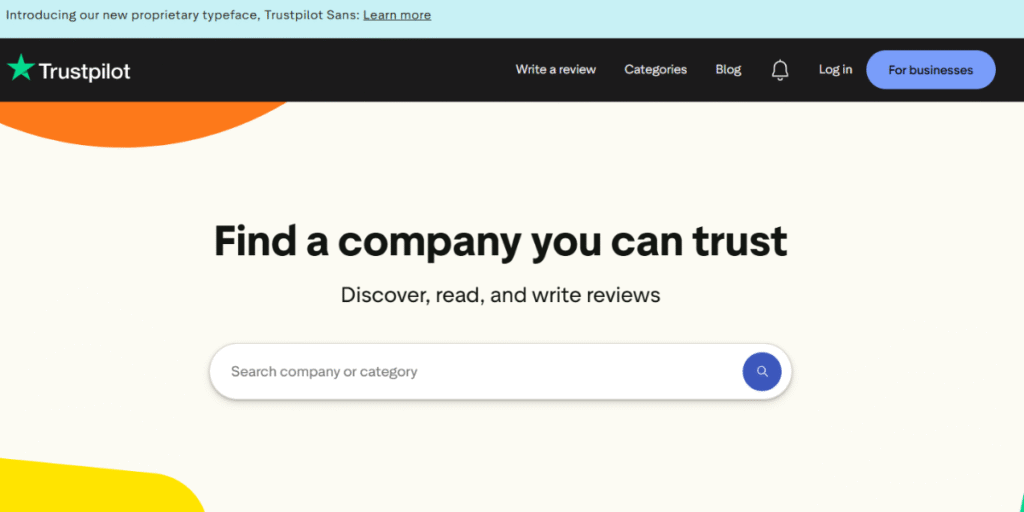
Trustpilot is both a business reputation management software and a review platform, with its open review ecosystem serving millions of businesses across the globe. The fact that the platform is a review collector and management tool at the same time gives businesses direct access to customer feedback and presents Microsoft to promote and manage reviews.
The advantage of Trustpilot is in the form of trust and its recognition among consumers and many customers will actually seek Trustpilot reviews to rate businesses. The strategy employed by Trustpilot is focused on openness and authenticity where a company should exhibit the required standards and offer the intrinsic means of it.
Key Features:
- First-party review collection and management platform.
- Auto‑send review invites
- Pages to fine tune your business page.
- Review analytics and trend spotting
- Collaborates With the leading online stores.
Pros:
- High brand trust and recognition
- Full control over the review flow
- Genuine, transparent review vibe
- e‑commerce integration
Cons:
- Doesn’t monitor outside review sites
- Basic social media follow‑up
- Extra costs for advanced options
- Not as feature‑rich as multi‑platform tools
Pricing: No free, Procedures begin at $299/month advanced goodies.
Best for: E-commerce brands desiring a respectable review system that simply fits in.
Website: https://business.trustpilot.com
9. ReviewTrackers
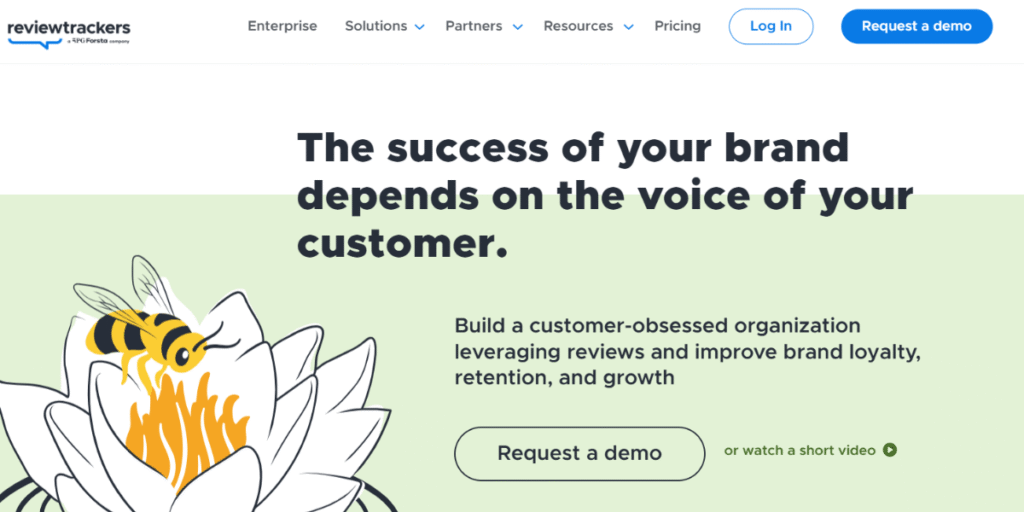
ReviewTrackers boasts an extensive coverage of the various review platforms to the business and offers simplicity in executing its operations. The site is also not bad at automated monitoring and alerting allowing businesses never to miss valuable customer responses. ReviewTrackers provides detailed analytics that allow businesses to know the trends regarding reviews, areas of improvements, and monitor competition. Being review-focused specifically, the platform serves especially well businesses in need of well-informed review management without extras.
Key Features:
- Extremely in-depth cover of all the review sites.
- Auto‑sent alerts and buzz when a new review drops.
- Toolset to view the competition in comparison.
- Single-point solutions to responses on reviews.
- Dashboards that deconstruct the data to enable you to take fast action.
Pros:
- Affordable plan that takes care of all you require.
- Designed primarily as a review wrangling tool, so it is excellent in that regard.
- Simple to install and an dogswhip to operate.
- Solid support team and plenty of training help.
Cons:
- Terribly weak in terms of social media.
- Lack of built in review collection feature.
- Crisis-management tools are rather rudimentary.
- Doesn’t plug into as many other apps as some larger platforms.
Pricing: $49/month onwards – options available.
Best for: Small to medium businesses looking to nail review management.
Website: https://www.reviewtrackers.com
10. BrightLocal
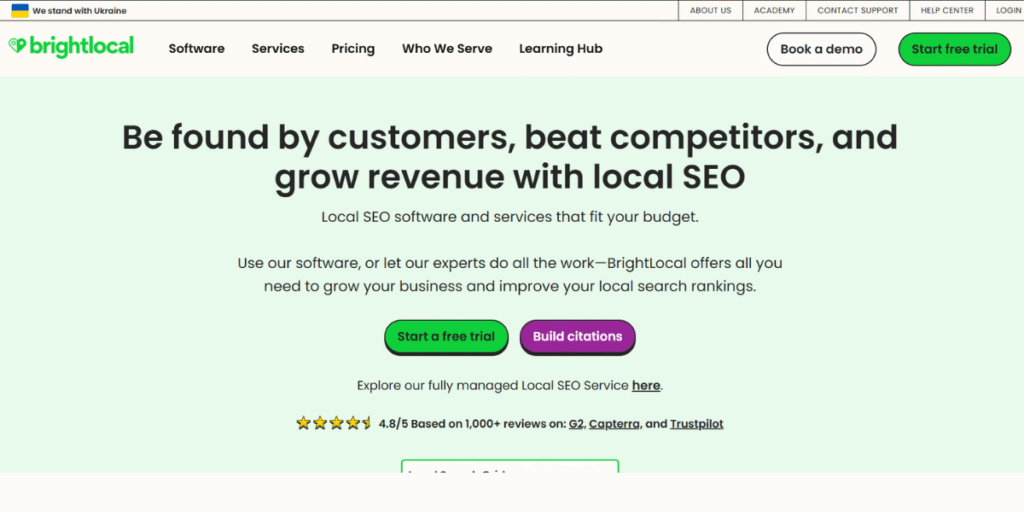
BrightLocal is a local search and reputation management software tailored to businesses with intense local market specification. BrightLocal’s model combines citation-building, local search-following and review-management into a harmonious framework that enhances the visibility of local search. It provides in-depth local search ranking results with the option of it being easy to manage customer reviews and inventory listings. The fact that BrightLocal specializes in local markets particularly benefits businesses whose operations allow local areas such as restaurants, retail outlets, and service delivery providers.
Key Features:
- Handy local SEO audit and optimization tools.
- Construct references and maintain your entries clean.
- Monitor reviews on the large platforms.
- Monitor performance on local search and obtain performance reports.
- Provide white-label reports to agency clients.
Pros:
- Zeroed‑in knowledge of local search game‑plan.
- Good value for local‑business features.
- Engaging analytics that bring into view the local measures of interest.
- Great help and learning resources from the team.
Cons:
- Enterprise level functionality of Lacks.
- Social media monitoring has little to be monitored.
- Focuses on local players, not national brands.
- Not many fancy automation options.
Pricing: begins with a price of $29/month of core local SEO and reputation tools.
Best for: Local companies and agencies that want to take over the local market.
Website: https://www.brightlocal.com
Strategies to Improve Business Reputation
- Proactive Review Collection: Develop regular procedures to seek reviews with satisfied consumers via email campaigns, SMS and face-to-face communication and schedule in-person follow-ups.
- Consistent Quality Service: Strive to provide the best customer experiences leading to positive feedback, resolving service problems before customer complaints, and surpassing customer expectations on a regular basis.
- Rapid Response Protocol: Set 24-hour response criteria to customer feedback, responding to negative feedback professionally, publicly congratulating positive feedback reviewers to show interest in customer satisfaction.
- Content Marketing Excellence: Develop valuable, informative content that demonstrates authority and builds trust and optimizes search engines so that positive information appears on the top of the search results when customers learn about your business.
- Employee Training Programs: Educate employees on the importance of reputation management, customer service excellence and proper social media behavior to ensure that brand is consistently represented across all customer interactions.
- Transparency and Authenticity: Communicate honestly about the business practices, acknowledge the errors when they happen, and show a true desire to change by turning words into action and changing policies.
Benefits of Effective Reputation Management
- Growth in Customer Acquisition: Great online reputation leads to more customers because positive reviews and ratings boost conversion rates, and customers will choose businesses with more favorable review scores than competitors every time.
- Greater Revenue Growth: Excellent reputation business companies have higher prices and higher volume of sales, as buyers have no hesitation to pay more money to the brands and services they trust and whose reputation is proven over the years.
- Greater Customer Loyalty: Good reputation management results in greater retention rates, repeat business, and quality word-of-mouth referrals by satisfied customers.
- Better Search Engine Appeal: Good reputation is an indicator of better local and organic search results which enhance online presence and make finding your business occur naturally to potential customers.
- Crisis Resilience: Well-organized reputations offer security in tough moments, with businesses that have high positive presence recovering more swiftly after negative events and sustaining consumer backing during turmoil.
- Competitive Market Advantage: Better reputation management establishes sustainable differentiation in crowded markets, making businesses stand out when customers have a range of choices and make decisions based on perceived trustworthiness and reliability.
Conclusion
Efficient reputation management is no longer a luxury, but a business need that directly affects revenue, customer base, and sustainability in the digital market environment of the present day. The Business Reputation Management Tools listed in this guide provide a variety of methods of monitoring, controlling, and enhancing your online presence, each possessing different strengths appropriate to different types of businesses and needs. For entrepreneurs seeking the World Best Business Opportunity, mastering these tools can provide a competitive edge and long-term growth potential.
Either you go with such enterprise-wide tools as Reputation.com and Qualtrics ORM to cover all aspects and areas or stick to more focused tools such as ReviewTrackers and BrightLocal, everything depends on what tools will suit your business objectives and operational needs.
Any reputation management must involve not only appropriate tools but also dedication to outstanding customer service, active communication, and continued enhancement through feedback. With proper Business Reputation Management Tools, the support of AI Cloud Business Management Tools, and an adoption of best practices in customer engagement, companies would be in a better position to develop stronger relationships, gain customer trust and have sustainable growth even in a highly competitive digital world.
FAQs
What are the Business Reputation Management Tools; what and why do I need them?
Business Reputation Management Tools are software platforms that monitor and track and assist in managing your business online presence in review sites, social media, and search engines, which are critical to retaining customer trust and competitive advantage.
How much should I budget for reputation management software?
Prices vary, with entry-level tools like ReviewTrackers costing $49/month to multiple thousands monthly with most small businesses identifying suitable options between 200-500/month depending on features required.
Is it possible to eliminate negative reviews with the help of reputation management tools?
Such tools will not eliminate valid negative reviews but will assist you in responding in a professional way, post-positive reviews and use strategies to enhance the overall rating by treating the customer better and engaging with them.
What is the best tool in small local businesses?
BrightLocal and ReviewTrackers are cheaper, specialized services that can serve local companies, whereas Birdeye and Podium are more complex, allowing them to expand their customer contact options, given an adequate budget.
What is the speed of reputation management results?
First-time monitoring will give first-time visibility, and reputation building will normally require 3-6 months of effort before it begins to demonstrate any tangible changes in review scores and search visibility.
 Get 50% off on Vault theme. Limited time offer!
Get 50% off on Vault theme. Limited time offer!